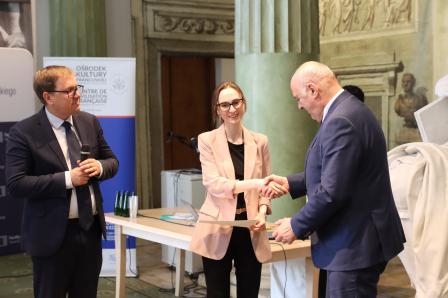Home » News » Important information »
Joanna Konopka from PW with the 2nd place and the audience award in the “My PhD in 180 seconds” competition.
We are proud to share the success of Joanna Konopka from Doctoral School of the Warsaw University of Technology, who won second place and the Audience Award in the “My Thesis in 180 Seconds” competition!
Photo by NAWA.
This unique event promoting science and the French language was held for the seventh time, with the regional final for Central Europe taking place in the prestigious Column Hall of the University of Warsaw. Ten PhD students presented their research – in French, on stage, and in just 180 seconds!
Joanna Konopka impressed both the jury and the audience with her passion, clarity, and the relevance of her presentation, earning two awards – a remarkable achievement.
As part of her doctoral research, our PhD student is developing a three-dimensional in vitro cell model (so-called Multi Organ-on-Chip), consisting of a vascularized breast cancer model and a liver model. Ultimately, the model may allow for testing new drugs and studying tumor angiogenesis, which is responsible for tumor growth, cancer cell metastasis, and the development of drug resistance.
The first stage of the competition (national level) was preceded by a short workshop, during which I learned the rules of the competition and received valuable tips regarding the structure of the presentation. I also used a variety of materials available online, which helped me enrich my specialist vocabulary. However, the key stage of preparation involved stepping away from the computer with just a sheet of paper. Carefully observing my surroundings, I began searching for a central theme for the presentation—one that would help me explain the research in a creative and accessible way. I decided to compare the cancer model developed in the laboratory to a model of a train system. After creating an outline/"script," I reviewed and refined it many times. During this process, I focused on both the scientific content and the presentation aspects (including gestures, voice modulation, and speaking pace). The competition was a very valuable experience for me, especially in terms of language development. I also appreciated the opportunity to exchange scientific experiences with PhD students from other European countries. The event was a rare occasion to establish contacts with representatives of scientific institutions and diplomatic bodies. The prizes were a very attractive bonus – said Joanna Konopka after the competition.
Congratulations to Joanna and all the participants – you’ve shown once again that science can speak in an accessible, inspiring, and multilingual way!
More information: HERE

